AN OVERVIEW OF COHOUSING
When I give presentations or consult for emerging housing options, I often hear that individuals with I/DD want to live in a supportive and affordable neighborhood. Walking to a friend’s home, having regular opportunities for activities, being recognized as a person who contributes to the lives of others, knowing neighbors will watch out for you or be there to help you make life decisions are features of neurodiverse intentional communities.
But what if instead of trying to find those communities, you got together with others and planned your own neighborhood? What would it look like? Who else would live there? What spaces would you want to share with others? What kind of culture or “feel” would you like it to have? What type of neighborhood activities would you plan?
People have been joining together to build their own neighborhoods for decades. These are not hippie communes, but rather a group of people from diverse lifestyles and backgrounds creating the neighborhood and community of their dreams. This type of intentional community is called cohousing.
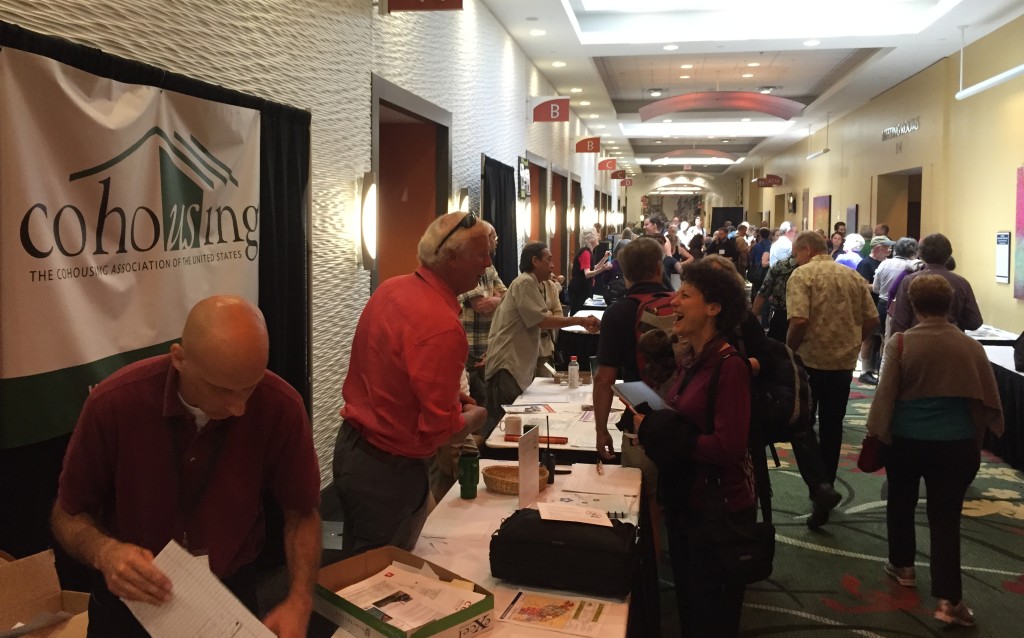
In 2011, I attended the National Cohousing Conference in Washington, DC. It fascinated me because, at that time, I was living in an intentional community in the city and could not imagine living in a house with 12 roommates once I was married with children. I learned during this conference that my living situation was just one example of an intentional community. After hearing about all of the different cohousing models across the country, I realized that I could raise a family in our own house with privacy while also having the common amenities and relationships that make intentional communities such wonderful and supportive places to live.
There are 161 established cohousing communities across the country. I have visited communities in Colorado, Utah, California, North Carolina, and Maryland. Many of these communities already include families or people with various disabilities. One of the most attractive things about cohousing is that it creates an environment conducive to supporting and accepting one’s neighbors as a close part of your life. Senior cohouisng communities are increasing in popularity for similar reasons. Individuals are choosing to age in intentionally supportive communities to prevent isolation, to have natural support systems, and to continue being valued by their community despite age-related changes.
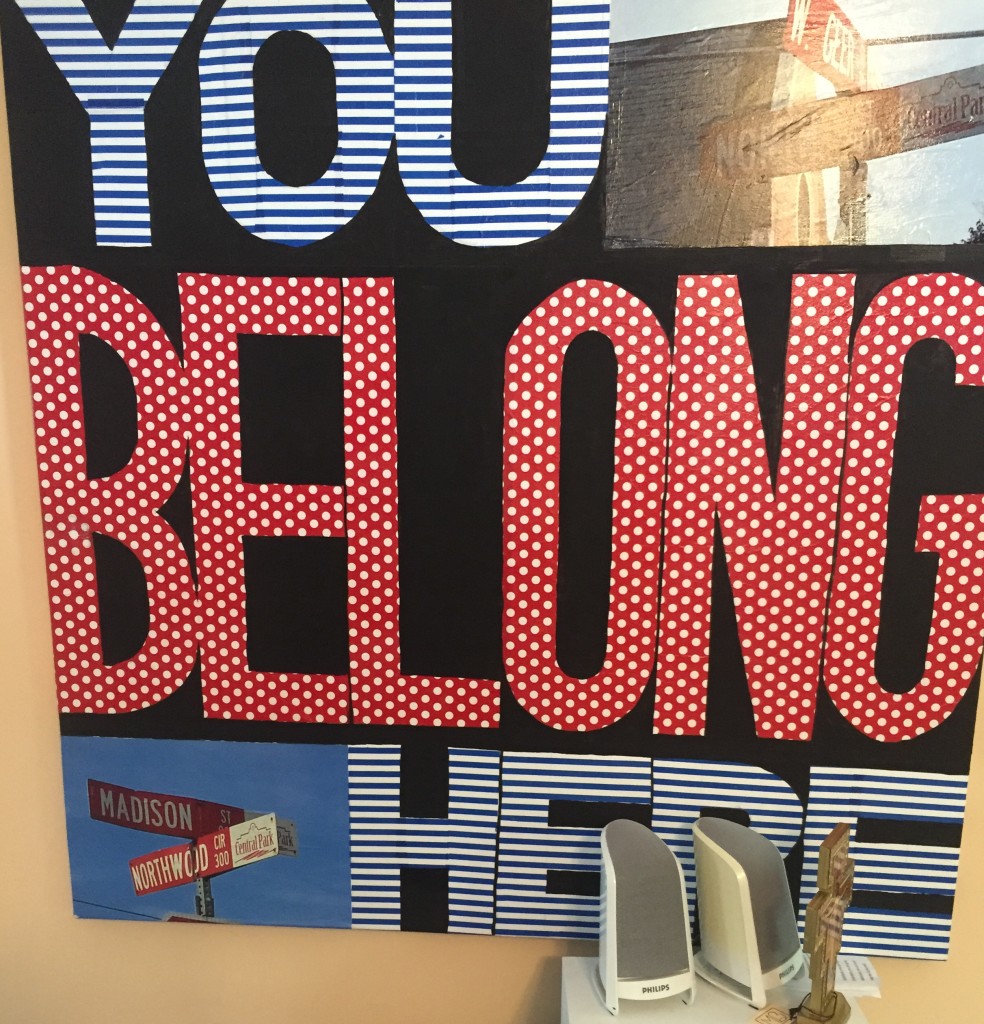
Over the past year, I have met groups of individuals interested in creating cohousing communities alongside autistic individuals and neurodiverse families. This is a sub-type of cohousing: neurodiverse cohousing. Several neurodiverse cohousing communities have created websites to share their visions: Osprey Village Cohousing, Building Ohana, Some Place Special Cohousing, and Rooster Ranch.
At the 2015 National Cohousing Conference, I introduced the concept of neurodiverse cohousing to cohousing supporters on a unique panel with other subtypes of cohousers including foster families and veterans. I met with autistic cohousing leaders, hosted a breakout session for those interested in learning more about neurodiverse cohousing, and then had the chance to visit a neurodiverse cohousing community called Northstreet Neighborhood.
NORTHSTREET NEIGHBORHOOD: AN EXAMPLE OF NEURODIVERSE COHOUSING
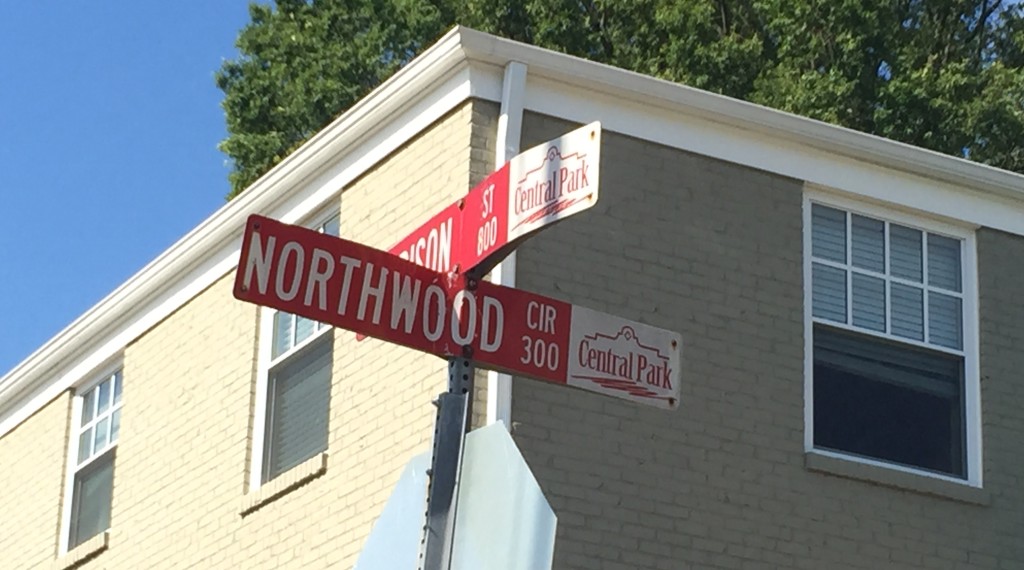
Located in Durham, NC, Northstreet Neighborhood has completely revitalized the greater community. Just five short years ago, on two city blocks, laid 15 shells of buildings, boarded up, collecting trash, and surrounded by overgrowth. With the help of a philanthropic investor, who took on the rehab of these brick shells at-cost, a small group of families from the same church began buying lots and building the homes that they and their community needed.
Despite the external uniformity of the homes, each has its own personality and custom interiors that are suited to the homeowner. For example:
- One family carved out ¼ of the space for their adult son who has a developmental disability. He has his own front door, kitchen, bedroom, bathroom, and living room. The other ¾ of the building is home to his parents and siblings. If they choose to move out, he could either create an additional income stream by renting the ¾ of the home to another family or move into the larger section of the home with his chosen roommates and rent the remaining ¼ to another person.
- One of the homes was purchased for a family member who has an intellectual and physical disability. She lives with a roommate who also uses an electric wheelchair and has two rental apartments upstairs.
- One of the homes was turned into a Friendship House where Duke Divinity students live with roommates who have intellectual disabilities.
- A smaller home was purchased for a resident with disabilities to live with his caregiver. It was rehabbed to ensure enough space for his electric wheelchair and assistive technology.
- A neurotypical couple bought one of the buildings with the intention of using the downstairs floor as a community space for neighborhood gatherings. They live upstairs and after building relationships in the community, the couple invited a young woman with disabilities to move in, as well.
Watch the video below to see my visit in-action.
Everyone who needs support services coordinates their own providers. Community activities and common meals are planned as desired, but everyone lives by their own schedule. There are no fences between the homes, and yards are used as common spaces such as a basketball court and a community garden. This is how neurotypical resident, Margot Starbuck, describes Northstreet: “Since the summer of 2012, about sixty new folks have moved into this Durham, NC neighborhood. We’re old and young. We’re white and black and Asian. We’re single and married. We’re homeowners and renters. We’re people with graduate degrees and people who learn in special education classrooms. Some of us are mostly able-bodied. Others aren’t. What we hope distinguishes us is that we want to be neighbors with one another and we want to be neighbors with our neighbors—the ones who’ve lived in Old North Durham for decades.”
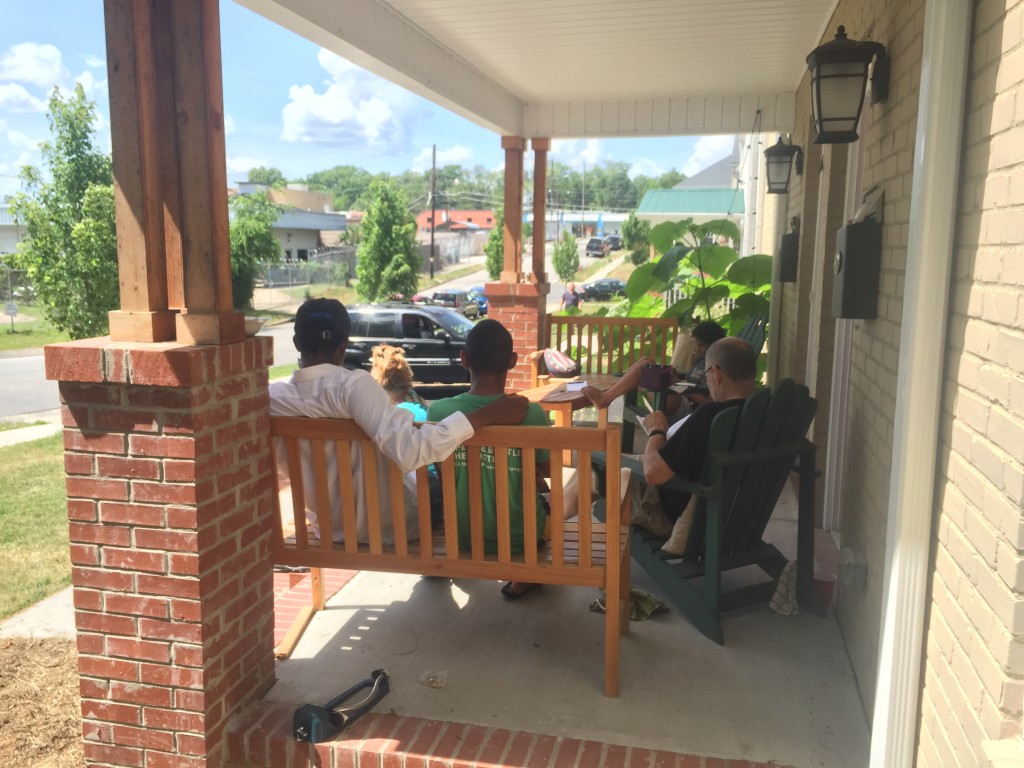
Sitting on the front porch with a few of the residents, I couldn’t believe how cars stopped to say “hello,” how other residents walked up for a quick chat before finishing unloading their groceries, and the sense of belonging that I felt, even as a stranger in their community. When I asked a young man with disabilities named “Slay” what makes Northstreet Neighborhood different from other places he’s lived, he replied, “Your heart is tied to community and that grows into trust and being vulnerable. It is one thing to go to a neighbor to borrow an egg, but to go next door crying because you’re dealing with something …”
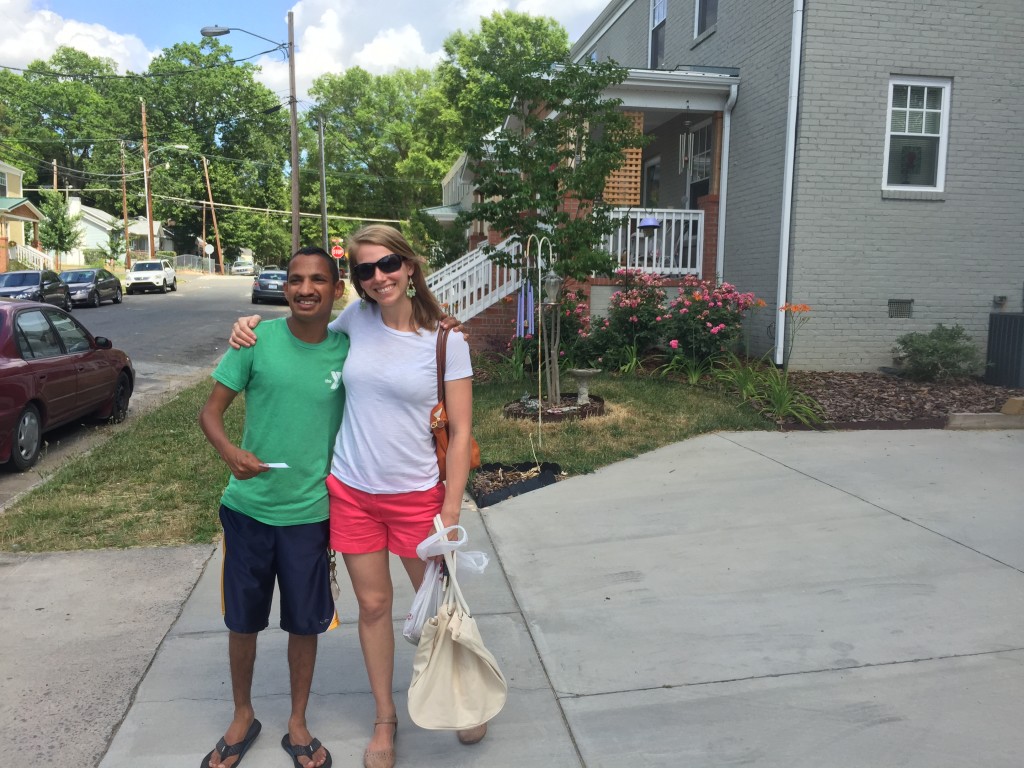
As the National Coordinator for the Coalition for Community Choice, a rapidly growing alliance of organizations across the country, I know there are ideological and policy barriers to any intentional clustering of individuals with disabilities as “segregating” or “isolating.” Neurodiverse cohousing is completely different than congregate care facilities that are often vilianized. It is simply a group of people who want to actively support and be supported by a neurodiverse community within the greater community. For those of us who have actually seen and lived in intentional communities, others don’t understand what the draw is until they actually go visit, and even then this lifestyle is not for everyone.
Want to meet people who have started and/or live in cohousing? April 30th is the National Cohousing Open House! Whether you are just curious, interested in moving into an existing cohousing community, or want to explore creating a neurodiverse cohousing community, it’s a great opportunity to get to know those in the cohousing world.
We all want to contribute to our communities as valued members of society, and neurodiverse relationships are pivotal in creating more integrated communities and better opportunities for individuals with I/DD. We need activities and places to build neurodiverse relationships, access to opportunities and supports that let individuals with I/DD teach others, and accessible attitudes and spaces. Families want to invest in stable housing and community options for their loved ones in hopes that they will find friendship and natural supports. Cohousing is one way to close these gaps, and the cohousing movement has years of experience and professionals to help local groups make their dream neighborhood a reality.
LEARN MORE
In just a few short weeks, the Autism Housing Network (AHN) will be relaunched with information on and examples of cohousing in the AHN Housing Directory. If you are planning a neurodiverse cohousing community, or would like to recommend an existing housing option you feel is worth sharing, please fill out this form to have it included in our launch. The AHN Resource Directory will allow you to easily find and share housing and lifespan resources. If there is a resource you would like to share with others, please fill out this form.
By sharing stories of exceptional housing solutions and resources, we can build a better future together! Follow the Autism Housing Network on Facebook for the latest updates!
ABOUT the AUTHOR
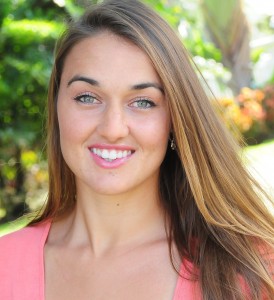
Desiree Kameka, Director of Community Education & Advocacy at Madison House Autism Foundation
Desiree’s work focuses on researching housing issues, advocating for autistic adults and their issues, and presenting her work at local and national gatherings. She visits many residential communities and social enterprises across the USA and highlights their unique victories and learning curves while sharing stories of residents with autism and other developmental disabilities. Desiree is also the project lead for Madison House’s interactive Autism Housing Network, which is currently in BETA testing. Her passion is empowering autistic adults and parents to create a future that is exciting and life affirming by offering small group consultations for forming projects.
 Featured Artist Mahlia Amatina | The Abstract Colourist Painter
Featured Artist Mahlia Amatina | The Abstract Colourist Painter



Hello,
I live in PA and have a high functioning Autistic 23 year old son. We are still trying to get SSDI for him as he is not capable of working more then 15-20 hours at the local Giant Food Store stocking fruit and vegetables. I am interested in finding a community that Christopher would fit into. I would not be against moving to Durham North Carolina once my husband retires but that is 5 or so years from now. Do you have any suggestions? Thank you for your time.
Anne